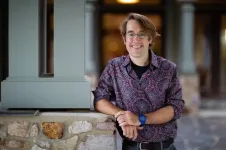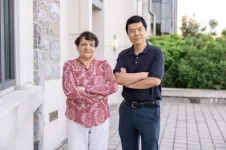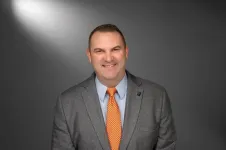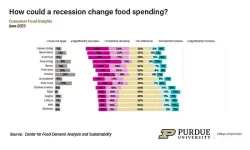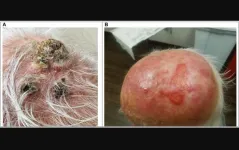(Press-News.org) Every night, uncounted numbers of devices across the globe update their operating systems (OS), and everyday users log on expecting fast, secure connections and services to keep their increasingly online lives moving forward. But as artificial intelligence and other more complex systems come online, the foundation of all them is teetering.
Every aspect of society — from government and industry to education and entertainment — relies on devices with stable operating systems. And every OS relies on a collection of millions of lines of code that underpin its functions. That large and growing collection of code is collectively called “the kernel,” and like the seed it is named for, it is essential to financial markets, business and industry, education, government, and national security.
“If it stops working, then nothing will work. The world would pretty much shut down,” said Dan Williams, assistant professor of computer science in the College of Engineering.
The problem? The kernel is written in an aging coding language called C and constantly grows bigger and more complex to serve more devices and applications. Meanwhile, fewer computer scientists become interested in working on it.
“It’s hard to get students interested in a tangled mess of code written in C when there is so much going on with artificial intelligence and other innovations. But all those innovations rely on the kernel. We need more people working on it,” Williams said.
To further that goal, Williams recently received a five-year, $600,000 National Science Foundation (NSF) Faculty Early Career Development (CAREER) award to explore new ways to stabilize and update the existing Linux kernel — globally one of the most frequently used kernels. The grant also will support educating new generations of computer scientists in the skills needed to work with the kernel.
“Dan Williams’ commitment to innovative work on this critical global challenge is emblematic of how our faculty and students lead the way,” said Cal Ribbens, head of the Department of Computer Science. “I believe the work his team does will encourage current and future students and faculty to tackle deep technical issues, such as a stable and robust OS kernel.”
Freezes and fixes
Part of the operating system of every server, computer, and networked device, the kernel acts like an air traffic controller — making sure software and cloud-based services run without crashing into each other. It sits between the hardware, software, and cloud services that users interact with, managing all communications between them. When a user touches an object on the screen or types on a keypad, it’s the kernel that ensures those commands are followed.
“When a computer freezes, that often points to a mistake in the kernel,” Williams said. “It’s working to fix something that went wrong. If it can’t fix it, the computer crashes — sometimes taking important data with it.”
All those overnight updates your OS does for you? Williams said many of those are fixes to bugs that have cropped up in the kernel. But the updates are bandages. Bugs, viruses, memory shortages, and other issues can slow it down and make the system vulnerable to attacks, like ransomware.
Globally, computing relies on just a handful of kernels, Williams said. A vast swath of devices, including Google, Amazon, and Android, run on the Linux kernel. No matter which OS a system uses, all kernels suffer from similar weaknesses, he said.
According to an analysis conducted in 2021, there are more than 28.8 million lines of code in the Linux OS kernel.
“It is so complex that no one person can understand all its functions,” Williams said. “And in some ways, it is mysterious even to those who study it. It’s a black box.”
Williams spent 10 years at IBM Research testing new ways to fix or replace the Linux kernel. But so many industries and critical government systems rely on it, changes can cause unintended problems. And the stakes are so high that it’s functionally impossible to replace it wholesale with a new one.
“The kernel is in many ways too big to fail. And this unchecked kernel complexity has become a significant barrier to entry for students and practitioners to learn or innovate at the kernel level,” said Williams. “If this is not addressed, we may lose any hope of improving, securing, or maintaining the essential kernels our society depends on.”
A new approach
Two years ago, Williams came to Virginia Tech with an idea for a new approach that could help stabilize the kernel and could also help more students get interested in studying it. Under this NSF CAREER grant, his research team will experiment with building a new open source extension framework that would target existing weaknesses in the kernel.
The idea is to build these sections of code in the more flexible and robust Rust language and install them as bypasses to problematic sections of the existing kernel. If the approach is successful, adding more extensions could, over time, replace the existing kernel with a better one — without disrupting existing applications and users.
Williams said his lab will work on creating a new model of the kernel for undergraduate and graduate students to experiment with. It could be used in new computer science classes and educational “boot camps.” Because anyone can use the open source code the team develops, it could spur more broad interest and experimentation.
The work also could prepare students for internship opportunities in industry to work on existing kernels in real-world situations.
“Without exposure to the real systems in use today, the number of students qualified and interested in operating systems kernels will fall below what it should be for a piece of software as crucial for society as the OS kernel,” Williams said. “Our efforts on this project can help us reach our educational goals, and the open-source nature of our work will allow those already working in this space to engage in innovative thinking and approaches around OS kernels.”
END
NSF CAREER award invests in the future of stable computing
Researcher Dan Williams and his students will study new ways to secure the foundation of all modern computing devices – millions of lines of code written in an aging computer language collectively called “the kernel.”
2023-07-12
ELSE PRESS RELEASES FROM THIS DATE:
Collaborative seed grants nurture high-impact social and environmental research
2023-07-12
The National Science Foundation, the National Institutes of Health, and the National Aeronautics and Space Administration have collectively awarded millions of dollars in grant funding to numerous Virginia Tech researchers who all have one thing in common.
They were awarded Emerging Social Aspects of Global Change seed funding.
Since 2015, this funding has led to faculty from seven colleges and 15 departments collaborating and engaging in 10 research projects that address the social or policy aspects of major global environmental issues.
Sponsored by Fralin Life Sciences Institute’s Global Change Center and the Institute ...
The picture of health: Virginia Tech researchers enhance bioimaging and sensing with quantum photonics
2023-07-12
Imagine you just swallowed a pill containing a miniature camera that will help your doctor collect images to diagnose a condition you’ve been battling for years. No, it’s not something from the latest science fiction or Marvel Comics movie – it’s a technique called bioimaging.
While traditional methods of bioimaging such as an MRI, CT scan, or an X-ray are more commonly known, the use of nanodevices is becoming more popular. They are less invasive and provide health care professionals with a closer look deep inside tissue.
Researchers from Virginia Tech’s College of Engineering and College of Science are using their expertise ...
Virginia Tech awarded $3.4 million grant to study the environmental effects of utility-scale solar installations
2023-07-12
As utility-scale solar farms become more widespread as a source of renewable energy, Virginia Tech scientists are researching environmental consequences with respect to stormwater and the sediment and nutrients transported in runoff.
With a $3.4 million grant from the Virginia Department of Environmental Quality, researchers from the College of Agriculture and Life Sciences will lead a comprehensive six-year study to determine how utility-scale solar farms impact stormwater runoff and local soil and water quality throughout the state.
“Solar is probably going to be the No. 1 land use change that will occur over the next decade in many parts of Virginia, particularly in existing ...
Rare brain tumor responds to targeted tumor treatment with ‘unprecedented’ success
2023-07-12
Papillary craniopharyngiomas (PCPs) are a rare type of brain tumor that cause substantial morbidity for patients. While surgery and radiation are often used to treat PCPs, incomplete removal of the tumor and toxicity from radiation can leave patients with life-long health challenges after treatment, including neuroendocrine dysfunction or vision or memory loss. Investigators from the Mass General Cancer Center, a member of the Mass General Brigham healthcare system, led the first multicenter treatment protocol in this rare tumor. The study was based on laboratory discoveries by Mass General Brigham researchers who studied the genetic drivers of PCP growth, ...
Salinity changes threatening marine ecosystems, new UNF study shows
2023-07-12
A groundbreaking study published today reveals the critical yet severely understudied factor of salinity changes in ocean and coastlines caused by climate change. The study was co-authored by an international team of researchers, including Dr. Cliff Ross, University of North Florida biology chair/professor, and Dr. Stacey Trevathan-Tackett, UNF biology graduate program alum and research faculty member at Deakin University in Australia.
Changes in salinity, or salt content, due to climate change and land use can have potentially devastating impacts on vital coastal and estuarine ecosystems, yet this has rarely been studied until now. This new research provides valuable ...
Two UTA professors selected as Fulbright scholars
2023-07-12
Two University of Texas at Arlington faculty members have received Fulbright U.S. Scholar Program awards from the U.S. Department of State and the Fulbright Foreign Scholarship Board.
Kevin Schug, Shimadzu Distinguished Professor of Analytical Chemistry in the Department of Chemistry and Biochemistry, will travel to Palacky University in Olomouc, Czech Republic, continuing a decades-long relationship that began during his days as a graduate student.
Ling Xu, associate professor in the School of Social Work, will use the award to travel to Taiwan and embark on 10-month project to raise awareness about the ...
Daughters breastfed longer, and women accumulated greater wealth in ancient California matriarchal society
2023-07-12
In a new study, researchers and members of the Muwekma Ohlone Tribe of the San Francisco Bay Area are the first to publish evidence of wealth-driven patterns in maternal investment among ancient populations.
Ancestors of the Muwekma Ohlone living 2,000 years ago at Kalawwasa Rummeytak in present-day Silicon Valley in California’s San Francisco Bay Area, placed high value on women’s economic contributions to their communities, according to the study. Women stayed in the villages in which they were born, and their male partners moved from their birth communities to join their wives’ families. Women’s intimate knowledge of the local ecology and female ...
Food insecurity rate hits 17% for the second time in 18 months
2023-07-12
Food insecurity rate hits 17% for the second time in 18 months
WEST LAFAYETTE, Ind. – Reported food insecurity has reached 17%, matching the rate last reached in March 2022, according to the June Consumer Food Insights Report. The new report also includes consumer changes in food spending as a result of a hypothetical recession and sentiments on artificial intelligence.
The survey-based report out of Purdue University’s Center for Food Demand Analysis and Sustainabilityassesses food spending, consumer satisfaction ...
Social isolation linked to lower brain volume
2023-07-12
EMBARGOED FOR RELEASE UNTIL 4 P.M. ET, WEDNESDAY, JULY 12, 2023
MINNEAPOLIS – Older people who have little social contact with others may be more likely to have loss of overall brain volume, and in areas of the brain affected by dementia, than people with more frequent social contact, according to a study published in the July 12, 2023, online issue of Neurology®, the medical journal of the American Academy of Neurology.
The study does not prove that social isolation causes brain shrinkage; it only shows an association.
“Social isolation is a growing problem for older ...
Cetuximab's effectiveness and toxicity in advanced cutaneous squamous cell skin cancer
2023-07-12
“Our data demonstrate that cetuximab plus radiotherapy represents an active treatment option for laCSCC, with manageable toxicity.”
BUFFALO, NY- July 12, 2023 – A new research paper was published in Oncotarget's Volume 14 on July 7, 2023, entitled, “Effectiveness and toxicity of cetuximab with concurrent RT in locally advanced cutaneous squamous cell skin cancer: a case series.”
Treatment for locally advanced cutaneous squamous cell cancers (laCSCC) remains poorly defined. Most laCSCC tumors express high levels of epidermal growth factor receptors (EGFR). Cetuximab has activity in other EGFR expressing cancers and enhances the effectiveness ...
LAST 30 PRESS RELEASES:
Blood test predicts which bladder cancer patients may safely skip surgery
Kennesaw State's Vijay Anand honored as National Academy of Inventors Senior Member
Recovery from whaling reveals the role of age in Humpback reproduction
Can the canny tick help prevent disease like MS and cancer?
Newcomer children show lower rates of emergency department use for non‑urgent conditions, study finds
Cognitive and neuropsychiatric function in former American football players
From trash to climate tech: rubber gloves find new life as carbon capturers materials
A step towards needed treatments for hantaviruses in new molecular map
Boys are more motivated, while girls are more compassionate?
Study identifies opposing roles for IL6 and IL6R in long-term mortality
AI accurately spots medical disorder from privacy-conscious hand images
Transient Pauli blocking for broadband ultrafast optical switching
Political polarization can spur CO2 emissions, stymie climate action
Researchers develop new strategy for improving inverted perovskite solar cells
Yes! The role of YAP and CTGF as potential therapeutic targets for preventing severe liver disease
Pancreatic cancer may begin hiding from the immune system earlier than we thought
Robotic wing inspired by nature delivers leap in underwater stability
A clinical reveals that aniridia causes a progressive loss of corneal sensitivity
Fossil amber reveals the secret lives of Cretaceous ants
Predicting extreme rainfall through novel spatial modeling
The Lancet: First-ever in-utero stem cell therapy for fetal spina bifida repair is safe, study finds
Nanoplastics can interact with Salmonella to affect food safety, study shows
Eric Moore, M.D., elected to Mayo Clinic Board of Trustees
NYU named “research powerhouse” in new analysis
New polymer materials may offer breakthrough solution for hard-to-remove PFAS in water
Biochar can either curb or boost greenhouse gas emissions depending on soil conditions, new study finds
Nanobiochar emerges as a next generation solution for cleaner water, healthier soils, and resilient ecosystems
Study finds more parents saying ‘No’ to vitamin K, putting babies’ brains at risk
Scientists develop new gut health measure that tracks disease
Rice gene discovery could cut fertiliser use while protecting yields
[Press-News.org] NSF CAREER award invests in the future of stable computingResearcher Dan Williams and his students will study new ways to secure the foundation of all modern computing devices – millions of lines of code written in an aging computer language collectively called “the kernel.”
